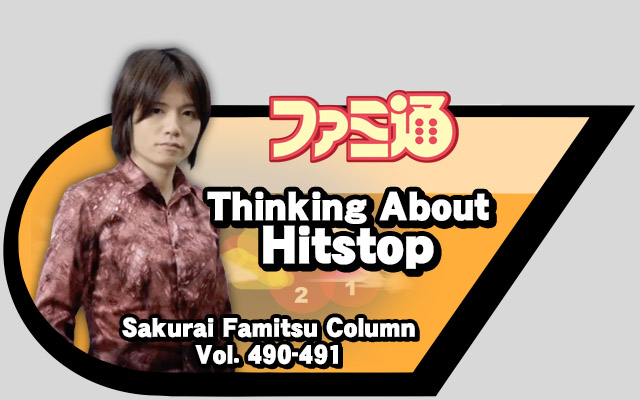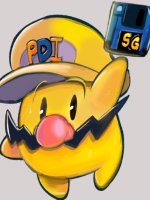All I read is someone who thinks he knows how game design works while he himself knows little to nothing about it.
Making a game that has depth but is also not complex is extremely hard like looking left and right at the same time. Sakurai has been attempting to pull this off with differing levels of success.
Smash was created as a simplification of complex inputs to allow players from most any skill level to play the game on a metalevel i.e: focusing on neutral, spacing, mindgames etc. (rather than getting stuck at simple execution)
Melee is an accident as it created an enormous gap between a skilled and unskilled player not based on the internal game that is played during a fighting game, but because again execution from the 'better' players trumps any of the earlier mentioned skills that should be emphasized in this series.
Naturally smash bros will NEVER be like melee EVER again under Sakurai's direction, as it should be.
If you so much as understood where this man is coming from and how he designed (not just smash but all of his) games then you might stop talking about things you know nothing of.
Maybe you should read up not just on smash, but on gaming history as a whole. Maybe read up on Nintendo's philosophy as well.
One tip: stop saying casuals and the hardcore in that sense. It's a way to play any game, not so much a personal identifier. As much as you may say the casuals know nothing, that's wrong. I have been a hardcore player of the GNT series until it got discontinued and have been fairly hardcore about playing smash bros, taking a break with melee and slowing down even now as I have other things keeping me busy in life.
As much as I may be a 'casual' at playing smash, it doesn't mean I don't understand the fundamental game design philosophy that is put into a game, because guess what: I went to game design school and got my ludology down pat.
Take it easy and try not to insult others' intelligence.
Cheers
I'd like to see you response to the other things JUDGE and I posted. We elaborated and covered a lot more ground than this one post.
First off, you're severely mistaking my use of casuals and hardcore, which I describe at length in the other posts. Either that or you're just ignoring how I'm defining it and insisting on your definition. Don't be caught up by that, though. Always look at how people mean things, not the things they use to signify those things. One of the fundamental issues is that I'm not using those words in a way where the label can be attached to anyone without a comparison to another person who would be described as more or less casual / hardcore.
The implication is that, no matter how much you fundamentally understand about game design, there is always the possibility that you could be in grave error since you've not properly learnt or may be utterly ignorant of the design or depth or complexity and so on of a particular game, therefore can both be a casual in reality and think very highly of oneself. Sadly, this is a sort of mistaken casual elitism (sounds like an oxymoron, I know).
Of course, I grant that, people who know design principles well have an easier time learning, but... what I explain later should help put the above passage in context.
Lastly, there's the tragic implication that one can't pass from a lower understanding into a higher one. This is one of the things I described in a previous post, and I hope by reading them you may see how it applies in relation to what you've posted and what I've posted below.
I'm sure there's a lot more from the other posts that I'm forgetting. Please check them out.
Before we begin, you insult my intelligence in a backhanded manner: "All I read is someone who thinks he knows how game design works..." then lastly you say to try not to insult others' intelligence. Then you assume I've not studied game design outside of Smash Bros. at all. Even if I hadn't, that criticism would be entirely irrelevant, as it's reducible to an ad hominem, the circular insinuation being that, since I'm wrong, I must not have studied enough, and that since I've not studied enough, I'm wrong. Either way, I'm wrong. You're defining yourself into a corner while throwing vicious darts, but you've no recourse when these fail. Now, either I take it as you didn't realize your mistake or that you're deliberately being inconsistent and insulting. I'd prefer the first: I'd rather make a mistake than a hypocrite and hope you think likewise.
Your analogy lacks clarity, however. I'll attempt to elaborate and flavor what you said.
The goal of magnanimous game design is to create as much depth of play with as little complexity as possible, on this we seem to agree.
Good balance, for example, means that one has to be more aware of all the possible options one could execute, thus increasing the breadth of applicable options, but the complexity of the issue is little changed because all the characters fundamentally abide by the same rules, and are roughly consistent and good in communicating to the character how they function and why. In this way, we see that what's most influential on complexity isn't the breadth of knowledge that's required at any given level, but rather how easily that knowledge can be assimilated and applied by a player. The easier something is to grasp, the less complex it appears. Learning and skill development occurs in curves, and complexity goes down as a player's learning and skills go up. Depth is dependent on the player-developed meta, rather it is an expression at each skill level of the variety of viable emergent gameplay. We see in this way that the depth at any particular skill / knowledge level is dependent on the breadth of play at said skill / knowledge level, rather than a player's ability to get to that skill level and knowledge.
Let's go back to that "roughly consistent and good" part in the case of Smash Brothers. I believe what most people mean by "jank" is that something breaks these sorts of expectations and must be learned by rote or as exception to the rules. Rules and expectations are things like "hitboxes will be placed roughly were people would expect them if someone did this attack in real life, so for a kick it would be on the leg as it moved along." One might observer, however, jank may be applied in really cool ways to change the balance or depth of play at a given skill level. Developer's choice once the groundwork is laid is primarily of the question "what can I add that will increase the depth of this game in good proportion to the amount of complexity it introduces?" and moreover the prerequisite: "what is that acceptable proportion?" The clearest example is contained here: "Well, would it be better to wait for us to be able to hook our brains up to control things super easily and directly, or should I go ahead and make this game now with the inherently limited controller?"
Thankfully, Smash Bros. by its design is very intuitive to newer players, as I think we can all attest to. It's very easy to learn most things related to the game, precisely because the focus is less on raw execution thus less on developing muscle memory skills. Unfortunately, we are still limited by the necessity to memorize motions my muscle in order to execute things. As a designer, in my opinion, I'd readily say, however, the incredible, vast ocean of depth that wavedashing implies was far, far worth the moderate difficulty of learning the input. Sakurai might or might not have thought likewise, but that's irrelevant. It directly contradicts what you mean when you say "an accident," because depth and complexity are fundamentally contingent on the mechanics in place and the skill / knowledge of the player. Therefore, the developer's goals are utterly irrelevant to whether something is actually an accident in design or not, since it's not dependent on them. Unless, of course, you're defining accident as anything that's outside of a developer's express intention, which is a pretty silly way of defining it, IMO. Regardless,
developers are humans too, and can be incredibly mistaken as to the veracity of the merit of their designs or the designs of others.

